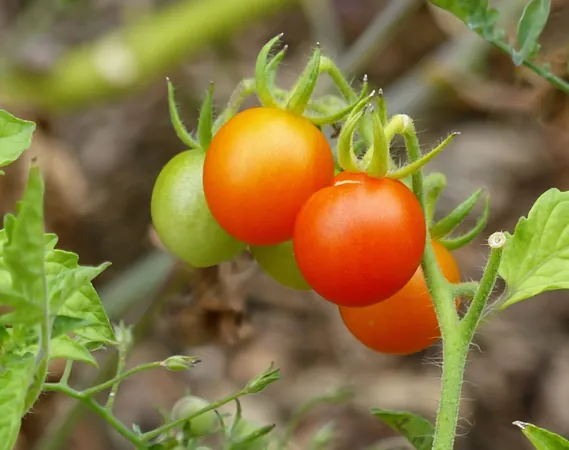
Tomatoes Turning Back Time: The Shocking Case of Reverse Evolution
2025-06-29
Author: Jacob
A Surprising Twist in Tomato Evolution
On the volcanic islands of the western Galápagos, a phenomenon is capturing the attention of scientists: wild tomato plants are unexpectedly reverting to a biochemical state not seen in millions of years. These plants are producing a toxic concoction of chemicals similar to those found in eggplants, signaling a remarkable twist in the evolutionary narrative.
The Enigmatic Process of Reverse Evolution
Typically, evolution is viewed as a one-way street, with organisms adapting and evolving to their environments over time. The concept of 'reverse evolution' is controversial, suggesting that species can recover ancient traits. Yet, scientists from the University of California, Riverside, argue they have observed just that in these Galápagos tomatoes.
"It’s not something we usually expect," explains Adam Jozwiak, the lead researcher. "But here it is, occurring in real time, on a volcanic island." The wild tomatoes are synthesizing an archaic type of alkaloid, a bitter chemical that acts as a defense mechanism, reminiscent of ancient relatives and distinct from their cultivated counterparts.
Unearthing the Chemical Mystery
In their study, researchers collected over 30 tomato samples from various Galápagos islands. On the older, eastern islands, tomatoes exhibited modern alkaloid production, while the younger, harsher western islands revealed a surprising twist: those plants were synthesizing a chemically distinct form akin to that produced by distant tomato ancestors.
This radical shift resulted from a mere four amino acid changes in a specific enzyme, altering the structure of the alkaloid molecules. To validate their hypothesis, the researchers manipulated the enzyme's genes in a lab setting, introducing them to tobacco plants, which then began to produce these ancestral alkaloids.
Survival of the Fittest: Adaptations to Harsh Environments
So, why are these tomatoes reverting to a primitive state? The researchers speculate that the rugged conditions of the western islands are prompting this evolutionary backtrack. With tougher surroundings, it’s possible these plants are relying on an older, more robust chemical defense strategy.
"The ancestral molecule may offer better protection in these challenging environments," Jozwiak suggests, pointing to the idea that evolution is not strictly linear but rather a flexible response to external pressures.
A Bold Assertion: Reverse Evolution in Action
Dubbed 'reverse evolution,' this case stands out not just for its rare nature—similar instances like snakes regaining limbs are few and far between—but for the precise genetic and chemical pathways documented. "While critics exist, our findings indicate a clear return to an ancestral state, and the evidence is compelling," Jozwiak affirms.
Implications for Humanity and the Future of Evolution
This groundbreaking research could have broader implications, hinting that if environmental conditions evolve drastically, humans might also face a similar reversal over extended periods. "It wouldn’t happen overnight, but it’s a possibility if circumstances change enough," Jozwiak warns.
Ultimately, as scientists continue to explore this unexpected evolutionary journey, new avenues for agricultural innovation may arise—ranging from improved pest resistance to potentially less toxic crop varieties. The Galápagos tomatoes are not merely a curiosity; they may offer a glimpse into the remarkable resilience of life and its ability to defy expectations under pressure.
Glimpse into Nature's Resilience
The full study has been published in the journal Nature Communications. What’s unfolding at the rocky edges of the Galápagos isn’t just about wild tomatoes—it's an extraordinary insight into how life can adapt, survive, and rewrite the rules of existence.









 Brasil (PT)
Brasil (PT)
 Canada (EN)
Canada (EN)
 Chile (ES)
Chile (ES)
 Česko (CS)
Česko (CS)
 대한민국 (KO)
대한민국 (KO)
 España (ES)
España (ES)
 France (FR)
France (FR)
 Hong Kong (EN)
Hong Kong (EN)
 Italia (IT)
Italia (IT)
 日本 (JA)
日本 (JA)
 Magyarország (HU)
Magyarország (HU)
 Norge (NO)
Norge (NO)
 Polska (PL)
Polska (PL)
 Schweiz (DE)
Schweiz (DE)
 Singapore (EN)
Singapore (EN)
 Sverige (SV)
Sverige (SV)
 Suomi (FI)
Suomi (FI)
 Türkiye (TR)
Türkiye (TR)
 الإمارات العربية المتحدة (AR)
الإمارات العربية المتحدة (AR)